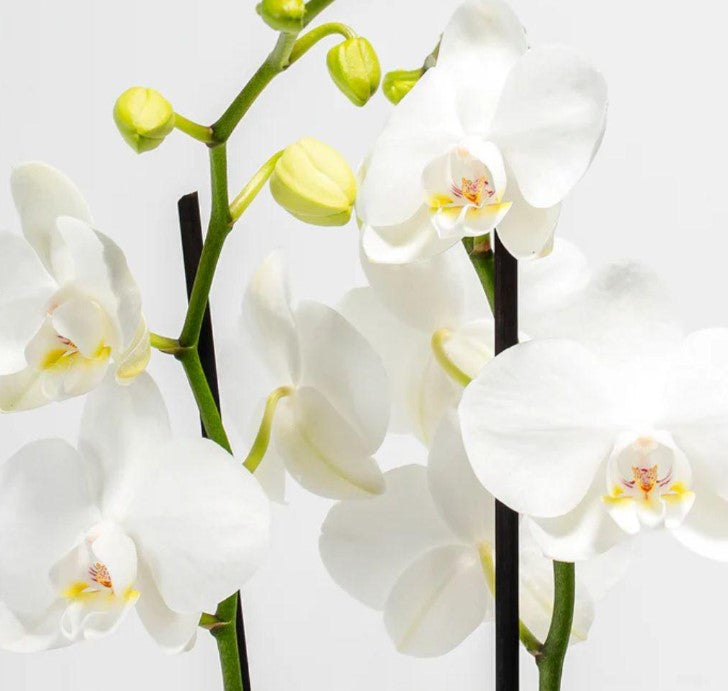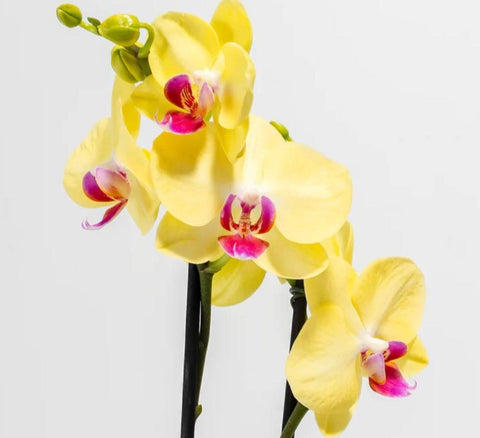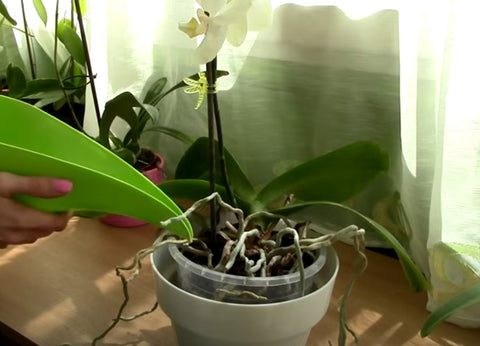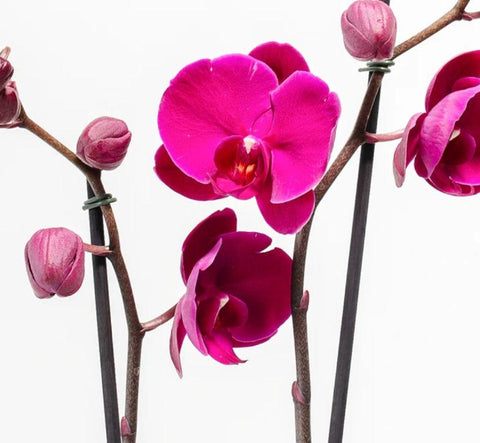How to Water Orchids: How often & How Much: The Complete Guide

Orchids, (Orchidaceae), are exotic flowering plants native to Asia and Australia. Year after year, they bloom into a dazzling array of colors and shades. However, to maintain their beauty, you should pay attention to their proper care, including the orchids' watering requirements.
The dainty look of orchids makes people think they’re delicate plants. So, it’s assumed that their regular care is daunting. But the good news is that getting their watering routine right is not too big a challenge. All they need is a consistent hydration to ensure their potting mix is moist.
Once you know how to water orchids, they’ll burst into unique blooms, lasting 2-3 months. So, keep reading and learn more about these fascinating houseplants.
Orchids Water Requirements: All You Need to Know

Orchids can grow into breathtakingly beautiful plants. All you need to do is meet their low-maintenance needs by regularly hydrating them and providing sufficient sunlight. Ensure that the plant gets a regular drink to thrive in any room.
How Much Water Do Orchids Need?
Orchids only need enough water to moisten the soil without causing sogginess. A quarter of a cup of water should do the trick. You should maintain a consistent watering schedule to ensure your orchid’s optimal health and vibrant look. Also, it’s a good idea to sync your hydrating routine with your specific orchid’s light requirements. For instance, full-sun orchids may need more frequent watering than medium-light varieties, such as the popular Moth orchids (Phalaenopsis spp.).
How Often Do You Water Orchids?
How often to water orchids depends on the season and environmental conditions. Generally, they’re watered once every 7-10 days in winter and twice a week in summer. They shouldn’t go longer than 2-3 weeks without a drink.
Remember that your orchid hates both overwatering and underwatering. If the weather is too dry or sunny, water it more frequently to avoid excess dryness. Adjust the schedule during cold or wet seasons to ensure the soil doesn’t become waterlogged.
When to Water Orchids
Water your orchid early in the morning. This will give it sufficient time to absorb moisture and nutrients from the cool soil. This process slows down when the soil gets warmer and dryer.
Also, any accidental splashes on the leaves or blossoms will dry out throughout the day. The absence of light and the cooler temperatures during evenings and nights can make the water stand in the soil and tray longer, which is not ideal as orchids don’t like wet feet.
How to Water Orchids in 3 Easy Ways

You can water orchids in three ways: misting, soaking, and over-the-soil watering. Each method has its advantages.
1. Watering Orchids Over the Soil
The most common method of watering orchids is top-down watering. Water the plant over the top of the soil thoroughly, and allow the excess water to drain through the pot's drainage holes.
This can be effective in keeping your orchid hydrated and healthy. Allow the water to run over the root for a few minutes. This will give the roots some time to absorb the moisture efficiently. After all, orchids are best grown in porous soil that doesn't retain water for that long
Can You Water Orchids With Cold Water?
You should use room-temperature or tepid water for orchids. But you can also use cold water. Some gardeners like to water orchids with ice cubes, while others think the cold can shock the plant.
However, studies show that this is a misconception. As the ice melts, the water slowly gets warmer, hence, there’s no risk of stressing your plant. Besides, the water seeps in slowly, preventing overwatering your orchid.
2. Is It OK to Soak Orchids in Water?
Most people consider soaking the best way to water orchids. Fill a sink with water for this method and immerse the potted plant. Then, leave the pot there to soak for about 5 minutes. Once the soil is evenly damp, remove the pot from the sink and let it rest for 15 minutes, so the excess water drains well.
This method gives orchids time to absorb as much water as the plant needs. There’s no risk of water pooling in the leaves, either. Remember to use a pot with proper drainage, otherwise, the process can backfire and cause the soil to become soggy. You can add water-soluble fertilizer to the water if needed and feed your orchid, too.
3. Do Orchids Like to Be Misted?
Misting is an easy method of watering orchids. For this method, spray 8-10 squirts on the leaves, soil, and exposed roots, avoiding the flowers. Consider misting, however, as a supplementary watering method for orchids. It is also useful when your plant can benefit from extra humidity in dry, hot weather. Avoid wetting the flowers and prevent water from pooling on the leaves.
How Do I Know If I'm Watering My Orchid Enough?

Orchids prefer a consistently moist growing medium. If you use the watering techniques correctly, a healthy orchid will flaunt gorgeous, perky flowers and shiny, firm leaves. It will also bloom up to 3 times a year, and the flowers will last 2-6 months.
However, orchids don’t like to sit in excess water and don’t appreciate parched soil. They will indicate clearly when they are overwatered or underwatered. So, keep an eye on your plant’s leaves and roots to identify such problems.
How Do You Tell If an Orchid Is Overwatered?
Signs of overwatering an orchid will first appear on the leaves and then reach other parts. You may even need to get your plant out of the pot to check its roots if you have identified symptoms of overwatering.
The following issues can indicate that the orchid is overwatered:
- Yellow leaves
- Drooping, wilted, or soft leaves
- Buds falling off before blooming, known as bud blast
- Unpleasant, rotten smell from the pot
- Soft, mushy, and black roots
Can an Orchid Recover From Overwatering?
With proper care, an overwatered orchid might recover if the root system is not completely damaged. Remove the plant from the pot to clean and trim the roots. Then, apply fungicide if you suspect an infection. Next, repot your orchid in fresh soil with sphagnum moss or pine bark. Pick a pot slightly larger than the current one, and ensure it has sufficient drainage holes. Water the plant properly and place it in a spot with bright, indirect sunlight.
How Do You Tell If an Orchid Is Underwatered?
The signs of an underwatered orchid are quite similar to an overwatered one. But they appear on the flowers first.
The symptoms of dehydration in orchids are as follows:
- Wrinkly, veiny, and wilting flowers
- Bud blast
- Dull and browning leaves (including brown spots)
- Crisp or wrinkled leaves
- Shriveled pseudobulbs
- Dry, brittle, and greyish-brown, or silvery-white roots
How Do You Fix a Dehydrated Orchid?
To help your water-deprived orchid recover, start by hydrating the plant properly. Use the top-down or immersion method to water the soil and hydrate the roots effectively.
Check the roots after 1-2 days. Soak them again in a water-filled sink if needed. Let the pot sit in the water for a few minutes, then drain it properly.
Repot the plant if the soil is depleted of nutrients and keep it away from harsh light and hot temperatures. Increase the humidity levels by misting your orchid occasionally. Also, water the plant regularly to ensure the dehydration issue does not occur again.
How to Water Orchids: FAQs
Q: Do orchids like egg water?
A: Your orchid loves egg water because it can get extra calcium and potassium from the eggshells. You can feed it a spoonful of crushed eggshells diluted in water. Or, use water, in which eggshells have been boiled. But remember to limit this natural fertilization method to only 2-3 times a year.
Q: Should orchid soil always be moist?
A: Orchids thrive in moist soil, and the moisture level of the growing medium should be consistent. However, remember that soggy soil can harm your plant’s root system and eventually kill the plant.
Q: Is it better to mist or water orchids?
A: Watering orchids using the top-down or soaking method is better than misting. Orchids need their growing medium thoroughly dampened once or twice every 7-10 days. Misting alone may not hydrate your orchids sufficiently, especially in the summer.
Q: Do orchids need rainwater?
A: Rainwater can be beneficial to your orchid plants. This natural water is free from chemicals present in tap water. It also contains a small quantity of nitrogen, a mineral that can help your orchid grow. However, it's not a requirement, especially if the plant is fertilized and you use filtered water.
Q: Where do you spray orchids?
A: While misting orchids, spray the leaves, exposed roots, and the growing medium with water. However, make sure to avoid misting the flowers to prevent damaging them. The petals may develop unsightly marks.
Q: Can an orchid go a month without water?
A: Don’t leave your orchids without water for too long. Anything longer than 3 weeks is risky for the plant’s well-being. Such big gaps between regular watering sessions are not recommended at all. You should water your orchid 1-2 times every 7-10 days. The frequency depends on the weather and light conditions.
Conclusion
Orchids are uniquely beautiful, and growing them can be a rewarding experience. As long as you take good care of them, water them regularly, and meet their variety-specific light requirements, you’ll enjoy their aromatic blossoms for months to come. Be it the pastel-pink and orange Arcadia Moth orchid or the delicate White Moth orchid, you can create a wonderful flowering display that elevates your space.
You can complement your orchids with air-purifying plants like the Rubber Tree, Areca Palm, Coconut Palm, and more, which will contrast beautifully with the colorful blooms of your Orchidaceae varieties.













